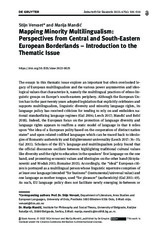Приказ основних података о документу
Mapping Minority Multilingualism: Perspectives from Central and South-Eastern European Borderlands – Introduction to the Thematic Issue
| dc.creator | Vervaet, Stijn | |
| dc.creator | Mandić, Marija | |
| dc.date.accessioned | 2023-01-02T10:50:19Z | |
| dc.date.available | 2023-01-02T10:50:19Z | |
| dc.date.issued | 2022 | |
| dc.identifier.issn | 2196-7016 | |
| dc.identifier.uri | http://rifdt.instifdt.bg.ac.rs/123456789/2730 | |
| dc.description.abstract | The essays in this thematic issue explore an important but often overlooked legacy of European multilingualism and the various power asymmetries and ideological values that characterize it, namely the multilingual practices of ethno-linguistic groups on Europe’s south-eastern periphery. Although the European Union has in the past twenty years adopted legislation that explicitly celebrates and supports multilingualism, linguistic diversity and minority language rights, its language policy has received criticism for tending to rely on and embolden national standardizing language regimes (Gal 2006; Leech 2017; Mandić and Belić 2018). Indeed, the European focus on the protection of language diversity and language rights appears to reaffirm a static model of language in that it relies upon “the idea of a European polity based on the cooperation of distinct nation states” and upon related codified languages which can be traced back to ideologies of Romantic authenticity and Enlightenment universality (Leech 2017: 34–35; Gal 2011). Scholars of the EU’s language and multilingualism policy found that the official discourses oscillate between highlighting traditional cultural values like diversity and the right to education in the speakers’ first language on the one hand, and promoting economic values and ideologies on the other hand (Krzyżanowski and Wodak 2011; Romaine 2013). | sr |
| dc.description.abstract | Есеји у овом тематском броју истражују важно, али често занемарено наслеђе европске вишејезичности, као и асиметрије моћи и идеолошке вредности које га одликују, односно вишејезичне праксе етнолингвистичких група на југоисточној периферији Европе. Иако је Европска унија у протеклих двадесет година усвојила законодавство које експлицитно слави и подржава вишејезичност, језичку разноликост и језичка права мањина, њена језичка политика је критикована због склоности да се ослања на националне језичке режиме стандардизације (Gal 2006; Leech 2017; Mandić and Belić 2018). Заиста, чини се да европска усредсређеност на заштиту језичке разноликости и језичких права заправо реафирмише статични модел језика, јер се ослања на „европску политику засновану на сарадњи различитих националних држава“ и на, с њима повезане, кодификоване националне језике, а такве идеје потичу од идеологија романтичарске аутентичности и просветитељске универзалности (Leech 2017: 34–35; Gal 2011). Проучаваоци језичке и вишејезичне политике Европске уније показали су да званични дискурси осцилирају између истицања радиционалних културних вредности попут различитости и права на образовање на првом („матерњем“) језику говорника, с једне стране, и промовисања економских вредности и идеологија, с друге стране (Krzyżanowski and Wodak 2011; Romaine 2013). | sr |
| dc.language.iso | en | sr |
| dc.publisher | De Gruyter | sr |
| dc.relation | Research for this article was supported by the Research Council of Norway Grant “Probing the Boundaries of the (Trans)National: Imperial Legacies, Transnational Literary Networks, and Multilingualism in East-Central Europe” (275981) | sr |
| dc.relation | info:eu-repo/grantAgreement/MESTD/inst-2020/200025/RS// | sr |
| dc.rights | openAccess | sr |
| dc.rights.uri | https://creativecommons.org/licenses/by/4.0/ | |
| dc.source | Zeitschrift für Slawistik | sr |
| dc.subject | South-East Europe | sr |
| dc.subject | Central Europe | sr |
| dc.subject | multlingualism | sr |
| dc.subject | multilingual education | sr |
| dc.subject | language policy and planning | sr |
| dc.subject | European Union | sr |
| dc.subject | European language policy | sr |
| dc.subject | multilingual communities | sr |
| dc.subject | minorities | sr |
| dc.subject | multilingual literature | sr |
| dc.subject | European periphery | sr |
| dc.subject | jugoistočna Evropa | sr |
| dc.subject | centralna Evropa | sr |
| dc.subject | višejezičnost | sr |
| dc.subject | višejezično obrazovanje | sr |
| dc.subject | jezička politika i planiranje | sr |
| dc.subject | Evropska unija | sr |
| dc.subject | evropska jezička politika | sr |
| dc.subject | višejezične zajednice | sr |
| dc.subject | manjine | sr |
| dc.subject | višejezična književnost | sr |
| dc.subject | evropska periferija | sr |
| dc.subject | border studies | sr |
| dc.subject | studijje granice | sr |
| dc.title | Mapping Minority Multilingualism: Perspectives from Central and South-Eastern European Borderlands – Introduction to the Thematic Issue | sr |
| dc.type | article | sr |
| dc.rights.license | BY | sr |
| dc.citation.issue | 4 | |
| dc.citation.volume | 67 | |
| dc.citation.spage | 501 | |
| dc.citation.epage | 510 | |
| dc.identifier.doi | 10.1515/slaw-2022-0025 | |
| dc.type.version | publishedVersion | sr |
| dc.identifier.fulltext | http://rifdt.instifdt.bg.ac.rs/bitstream/id/9493/10.1515_slaw-2022-0025.pdf |

